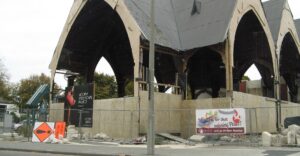
Community College as Career Center: Non-traditional Resources for Occupational Success
Program pre-requisites. Transfer credits. Internships. Work-based learning. Language development. Apprenticeships. Entrepreneurial support. All these resources and more are available to learners at today’s community colleges.
One Goal. Many Pathways.
Over the decades, higher education institutions have added programs and courses to reflect changes in local economies, populations, industrial evolutions, and other impactful societal events. With each iteration, the schools became more finely tuned to the needs of their constituents: their students and the businesses and industries that would hire them. That trend continues today.
Today’s evolving ‘college student’ demographic is compelling similar alterations in ‘doing educational business.’ Modern college learners are often older, usually more experienced, and definitely more focused on academic success than were previous populations. Schools are adapting their activities and offerings to support this diverse group as it wends its way through both classes and life challenges to find optimal careers and lifestyles.
One strategy that is rising as a primary structure for these learners is to provide ‘non-typical’ educational and training opportunities through campus-based resources. Emerging modalities that haven’t always been accepted as ‘college’ activities are growing in popularity as their efficacy and relevance increase. Students are no longer constricted by traditional (and often limiting) program styles of in-class attendance and required papers and projects. While those teaching methods are all very much present, today’s evolving educational panoply also includes training methods and recognition opportunities that have, until recently, been relatively rare to find in a higher education setting.
Maximizing Life’s Lessons – Competency-Based Learning
The higher education system is embracing the reality that many people arrive at a college opportunity with sometimes years of experience and knowledge. Those previously acquired resources can provide a foundation for the new student’s educational path, often eliminating the need for time- and money-wasting pre-requites. Rather than simply note this fact on the record, some schools are making efforts to measure and quantify these values so the learner builds on them as they craft their educational journey.
One way to capture these values is to provide assessment resources that will identify and highlight them. A problem that arises at this point is that too few people know to ask for the assessment, believing that their experiences haven’t developed marketable skills. The reality is that almost any activity can provide employment skills; those looking to enhance their knowledge base through higher education should assess how their existing talents and skill sets are already feeding their career-pursuit dream.
Early Employment
Early employment experience offers more than just hands-on job skills (think cash machine mastery, customer service scripts, etc.). It also allows the worker to explore work options that are best suited to their personalities and preferences. Many people opt out of training for occupations they didn’t enjoy so they can pursue futures filled with work activities they do enjoy. Assessing these preferences early in the higher ed process facilitates a better educational fit and also a more likely opportunity for student success.
On-the-job Certifications
Many occupations require workers to attain specific skillsets tuned precisely for the job at hand. In many cases, they must also demonstrate mastery of these skills to certify that they are, indeed, capable of performing the work. The resulting certifications can become the basis for a higher education career pathway, acting as foundational assets to further and more in-depth learning.
Service Learning
Some people mistakenly believe that only paid employment generates potentially valuable work skills. In reality, volunteering often offers similar or even enhanced career-type skills while also providing insight into the worker’s character. Unlike a paid employee, volunteers intentionally bring a good attitude, a willingness to work hard, and a teamwork spirit to their effort. They undertake the activities because they want to do them and not because they need a paycheck. Skills attained through volunteering are as credible and viable as those gained through paid work experience.
Military Service
Many people don’t recognize the educational value of their military experience. While the focus of a military enlistment is to further government objectives and not necessarily those of the soldier, those activities definitely provide job and thinking skills that transfer into other arenas in life. Further, while many former military positions aren’t replicable in civilian life, certainly the work skills of punctuality, critical thinking, and teamwork are highly valued by most employers in the non-military economy.
Maximizing Career/Classroom Resources
In addition to class and program work, colleges also offer other forms of occupational learning that some potential students aren’t aware of or don’t believe are appropriate for their preferred education track. In many of today’s higher ed courses, hands-on learning is built into the program’s curricula.
Career Technical Education
Many schools offer training for specific occupations – ‘career technical education (CTE)’ – not just academic study for bachelor’s degrees. In fact, many jobs derived from a CTE perspective attract non-traditional learners simply because they are aimed at those distinct populations. Federal funding through Carl D. Perkins grants provides training programs for people with disabilities, single parents, former foster youth, and other groups with challenges that would struggle in a traditional educational program.
Apprenticeships
The use of apprenticeships in higher education is groing because of their capacity to quickly and comprehensively train a worker for a specific job at a specific company. Apprenticeships attained through a higher education portal are typically designed by both the school and the enterprise to ensure the learner achieves all appropriate goals to graduate successfully and find work. In addition to exposure to work-related nuances, apprentices also enjoy the input and support from their work colleagues and mentors.
Entrepreneurialism
Even those who don’t want to work for someone else’s company can gain valuable career experience and information by engaging with the entrepreneurial entities in their region, many of which are embedded in the collegiate constellation of resources. The Small Business Development Center (SBDC), a federally funded agency, focuses on helping individuals launch and grow their businesses by providing both tangible (funding, documentation, etc.) and intangible (advice, strategic planning, etc.) assets to would-be business owners. The fact that so many entrepreneurial companies are opening in the post-COVID era indicates that America’s workforce is branching out into new, uniquely personal avenues of economic growth.
Many of today’s colleges are expanding their nontraditional education offerings as more nontraditional workers flood their campuses. By doing so, they are assisting not just their student body in finding the work and careers they want but also their community in finding stronger, more sustainable economic growth by engaging with a larger percentage of its population.


